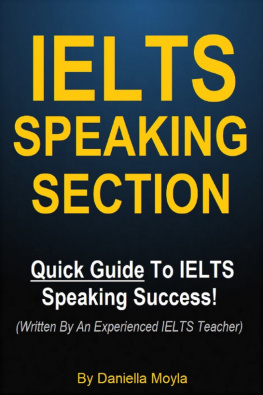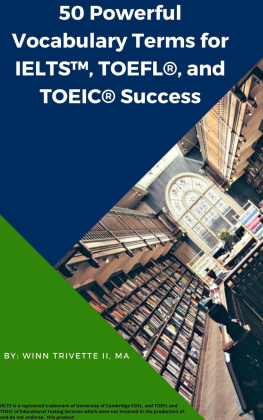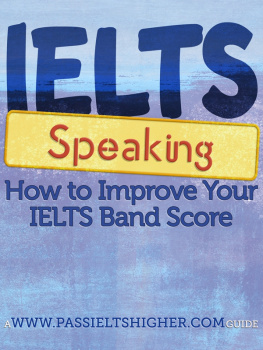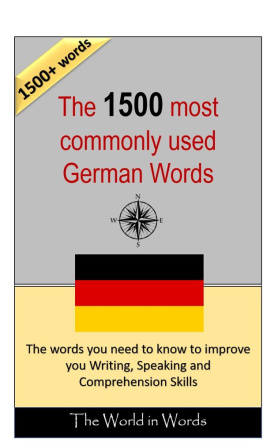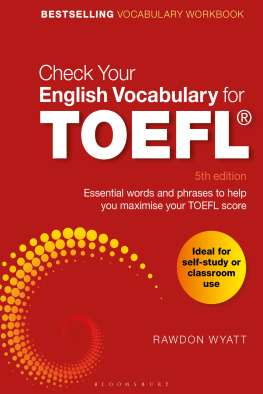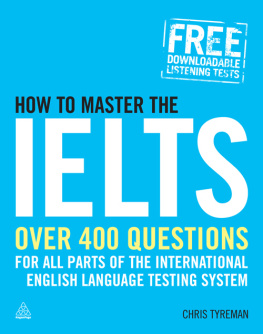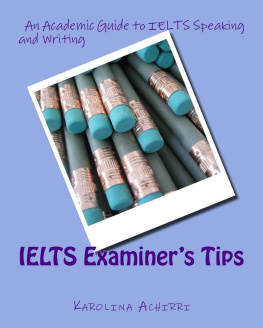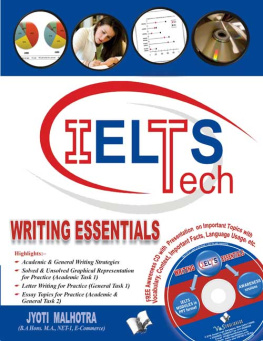IELTS
Topic-Wise
Writing
Band 8
Vocabulary
2021
By
Kanchan Suyash
Text Copyright 2021 by Kanchan Suyash
All rights reserved. No part of this book may be reproduced in any form without permission in writing from the publisher, except for brief quotations used for publishable articles or reviews.
Legal Disclaimer
The information contained in this book IELTS Topic-Wise Writing Band 8 Vocabulary 2021 By Kanchan Suyash and its contents is not designed to replace any form of medical or professional advice; and is not meant to replace the need for independent medical, financial, legal, or other professional advice or services that may be required. The content and information in this book have been provided for educational and entertainment purposes only.
The content and information contained in this book have been compiled from sources deemed reliable, and they are accurate to the best of the Author's knowledge, information, and belief. However, the Author cannot guarantee its accuracy and validity and therefore cannot be held liable for any errors and/or omissions. Further, changes are periodically made to this book as needed. Where appropriate and/or necessary, you must consult a professional (including but not limited to your doctor, attorney, financial advisor, or other such professional) before using any of the suggested remedies, techniques, and/or information in this book.
Upon using this books contents and information, you agree to hold harmless the Author from any damages, costs, and expenses, including any legal fees potentially resulting from the application of any of the information in this book. This disclaimer applies to any loss, damages, or injury caused by the use and application of this books contents, whether directly or indirectly, whether for breach of contract, tort, negligence, personal injury, criminal intent, or under any other circumstance.
You agree to accept all risks of using the information presented in this book. You agree that by continuing to read this book, where appropriate and/or necessary, you shall consult a professional (including but not limited to your doctor, attorney, financial advisor, or other such professional) before using any of the suggested remedies, techniques, or information in this book.
Contents
Before we begin
"Why is it necessary to learn vocabulary for the IELTS Test?" you might ask.
Since IELTS is an English Language Proficiency Test, a strong focus on vocabulary is placed while evaluating a candidate's overall score.
Speaking, Writing, Reading, and Listening are the four parts of the IELTS test. "Vocabulary" is the one feature that all of these modules share in common. Vocabulary is unquestionably one of the most important qualities to have in the Speaking and Writing parts. It will account for up to 25% of your overall score . It is also relevant in the Listening and Reading areas.
One of the Building Blocks of Language is Vocabulary
In our daily lives, we use a variety of terms to express our concepts, feelings, and sentiments to others around us. Often, we are able to interact effectively, although on other occasions we are unable to express the true essence. "This is not what I mean," we say over and over. A decent vocabulary, on the other hand, would undoubtedly aid you in conveying the correct meaning.
The same is true with your IELTS Speaking and Writing tests.
When you have a limited vocabulary, you are more likely to repeat terms within a passage. When you run out of vocabulary while conversing with your examiner, you keep repeating the phrase over and over.
It is Not All About Using New Words When It Comes to Vocabulary
Aspirants also believe that memorising a long list of terms would help them expand their vocabulary. However, they are unaware that language is more than simply acquiring new terms.
Do not concentrate only on memorising collections of phrases. Instead, make it a routine to read them alongside the letter. It is critical to comprehend their definition, learn their synonyms, and practise using collocations such that you can use them appropriately.
Vocabulary for IELTS
Is Using Complex Words the Only Way to Improve Your Vocabulary?
When you use complex terms in your IELTS Academic or General Writing, it is clear that the assessor may figure out that you are trying to please the interviewer. It is unnatural, and the grade will suffer as a result.
When it comes to the IELTS Speaking section, you stumble or keep repeating the sentence when looking for complicated terms. This impacts your fluency, and you lose points as a result.
You do, without a doubt, have a large vocabulary, but you must also know how to use it carefully and properly. Knowing a large number of terms and tossing them into your thesis by using them in conversation with your examiner without considering their context can get you into trouble.
Quick Tips
Read and listen : The majority of vocabulary is learned by context. So, find a broadcast, a podcast, a journal, or a book that interests you. Do not listen to or read anything that does not concern you and it can cause you to get overwhelmed.
Write down the following words : Make it a routine to jot down new phrases you come across, grasp their meanings, and learn how to use them correctly.
Use Memory Techniques : It is not enough to learn new vocabulary. It is therefore important to remember them. As a result, you can continue to revisit the terms you have already learned at frequent intervals. Consider revising them in a week, ten days, two weeks, or a month, depending on the schedule.
Training, practise, practise : You would use the terms you write down when voicing and writing, allowing you to maintain track of your language on a daily basis.
Exam performance is dependent on IELTS vocabulary abilities. Make sure you not only remember but also appreciate words in detail while taking the IELTS Test. Prepare to use the words effectively in both writing and speaking.
Lesson 1: Accommodation
- Balcony an area with a wall or bars around it that is joined to the outside wall of a building on an upper level
- Brick a rectangular block of hard material used for building walls and houses
- ceiling - the upper surface of a room that you see when you look above you
- concrete - a very hard building material made by mixing together cement, sand, small stones, and water
- cottage - a small house, usually in the countryside
- gadget - a small device or machine with a particular purpose
- housing - buildings for people to live in
- landmark - a building or place that is easily recognized
- lift shaft - a vertical shaft in a building through which a lift moves to different levels.
- occupant - a person who lives or works in a room or building
- platform - a flat raised area or structure
- quarry - a large artificial hole in the ground where stone, sand, etc. is dug for use as building material
- residence - a home; the place where someone lives
- steel - a strong metal that is a mixture of iron and carbon
- timber - wood that is prepared for use in building, etc
- airy - with a lot of light and space
- conventional - traditional and ordinary
- cosy - comfortable and pleasant, especially (of a building) because of being small and warm
- cramped - not having enough space or time.
- disposable - used once then thrown away
- exterior - outer; on or from the outside
- futuristic - relating to the future, or very modern or advanced
- high-rise - a tall modern building with many floors
- mass-produced - produced in large numbers using machinery



